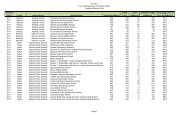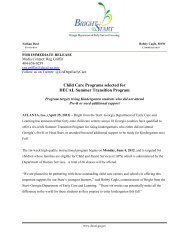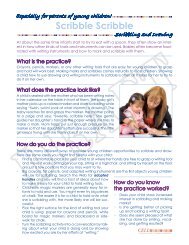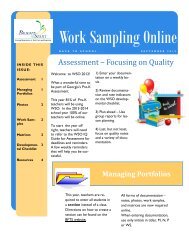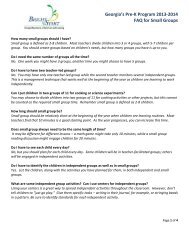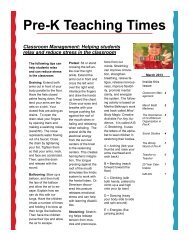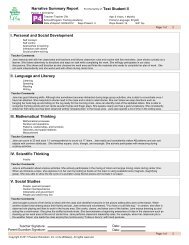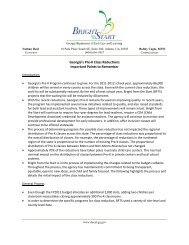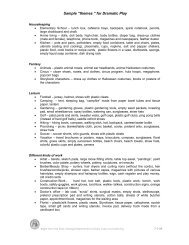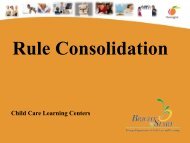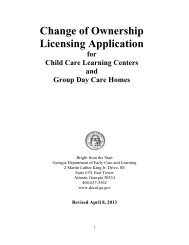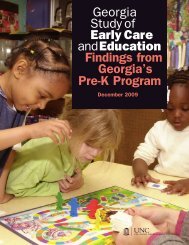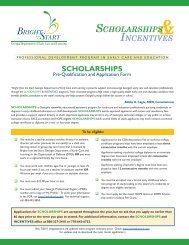Acknowledgements - gapitc
Acknowledgements - gapitc
Acknowledgements - gapitc
Create successful ePaper yourself
Turn your PDF publications into a flip-book with our unique Google optimized e-Paper software.
This Activity Guide for Parents* is written<br />
to go hand-in-hand with the Georgia Early<br />
Learning Standards** (GELS) for children<br />
from birth through age three. It includes<br />
activities to do in the home. The activities are designed<br />
to make the standards “come alive” in practical ways.<br />
There is also an Activity Guide for Teachers***<br />
with activities to do in classrooms and family child<br />
care settings.<br />
A panel of center-based and family child care<br />
teachers, parents, and early childhood specialists<br />
completed in-depth reviews of the Activity Guides.<br />
They suggested revisions, contributed activities, and<br />
offered numerous valuable comments to improve the<br />
finished product. Additionally, the broader early childhood<br />
community had the opportunity to comment on<br />
the format and content of the Guides at a series of<br />
Feedback Forums.<br />
The Guide for Parents is organized by age groups,<br />
with activities for Infants, One Year Olds, Two Year<br />
Olds, and Three Year Olds. Each age group contains<br />
activities in the five areas of development covered in<br />
the GELS – Physical, Emotional & Social, Approaches<br />
to Learning, Language & Literacy, and Cognitive.<br />
Where possible and practical, the activities in the Guide<br />
for Parents “match” those in the Guide for Teachers<br />
to encourage continuity between home and school.<br />
GELS Activity Guide for Parents<br />
Introduction<br />
The goals of the Activity Guide are to offer<br />
parents:<br />
• a quick reference to the standards, indicators of<br />
each skill, and sample child behaviors included in<br />
the GELS<br />
• examples of activities and strategies that link with<br />
each standard<br />
• specific “tips” for children with special needs and<br />
for language and cultural inclusion<br />
• general “tips” with developmental information and<br />
others suggestions realting to each standard<br />
Activities and Strategies<br />
It is important to describe what the activities are and<br />
what they are not. The activities are<br />
• linked directly to the standards, indicators, and<br />
sample behaviors in the Georgia Early Learning<br />
Standards<br />
• examples of the kinds of activities parents and<br />
teachers can do to help children make progress<br />
toward the standards<br />
• examples of the kinds of activities parents and<br />
teachers should look for in other resources<br />
• designed to assure parents and teachers that they<br />
are on the right track if they do similar activities<br />
at home and in school<br />
• compatible with developmentally appropriate<br />
curricula<br />
* Throughout the Activity Guides, the term “parent” refers to adults, most commonly family members, who are the primary caregivers of children in their home.<br />
This includes, mothers, fathers, grandparents, foster parents, stepparents, aunts, uncles, nannies, babysitters, and others who care for the child in the home on a<br />
regular basis.<br />
** The full Georgia Early Learning Standards document can be found in the Child Care Services Section of the Bright from the Start website at www.decal.<br />
state.ga.us. Copies can also be requested by calling 404-656-5957.<br />
*** The term “teacher” refers to adults who work directly with children in group settings. This includes classroom teachers and teaching assistants, paraprofessionals,<br />
caregivers, family child care providers, home based teachers, and others who have direct contact with children in groups on a regular basis.<br />
v



